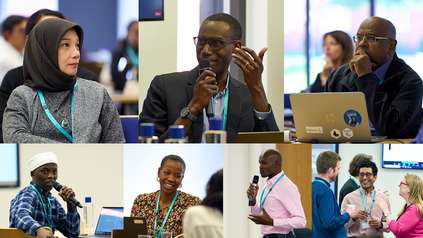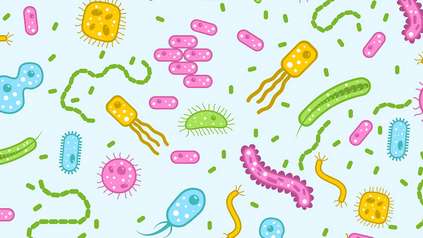New project to understand the relationship between the microbiome and mental health gets underway
Research has suggested a possible connection between the gut microbiome – the collection of microorganisms living in the digestive tract – and mental health in adults1, but little is known about gut health in childhood and its impact on mental health in later life. To address this gap, a new project supported by a £6.9 million grant from Wellcome, is starting this year.
The project, called ‘Microbes, Milk, Mental Health and Me’, is being led by researchers at the University of Liverpool and the Wellcome Sanger Institute, who will investigate the gut microbiome in 7,000 babies and their mothers. The team will analyse poo samples from the participants, until the babies are two years old. They will characterise all the microbes present in the samples, using high throughput genomic techniques previously developed at the Sanger Institute2. The researchers will also analyse breast milk, which provides growing babies with nutrients as well as good bacteria from their mothers.
The project is a partnership between the Wellcome Sanger Institute, Wellcome, the University of Liverpool, Liverpool City Region Combined Authority, Liverpool City Council, the Liverpool Women’s NHS Foundation Trust and NIHR Clinical Research Network North West Coast, University College London, and the University of Manitoba.
The gut microbiome is vital for human health, as it helps us digest food and prevent infection. Disruptions to the microbiome are thought to play a role in a number of conditions including autoimmune disorders, irritable bowel syndrome and cardiovascular disease. The questions of precisely how the microbiome, and which specific species, might be contributing to a disease, are yet to be resolved.
The ‘Microbes, Milk, Mental Health and Me’ project is part of the new Children Growing Up in Liverpool (C-GULL) study, based in Liverpool3. C-GULL will track the health of 10,000 babies and their families, from early pregnancy to childhood. Researchers will collect data on different aspects of the participants’ health, social circumstances – like income, education and housing, and environmental exposures, such as pollution. They will also collect real-time data using wearable devices and apps to track physical activity, sleep patterns, diet and mental health status.
The aim is to unlock new insights into human health and work with people living in deprivation, who are often underrepresented in research studies, yet face a higher risk of health issues, including mental health problems, obesity and diabetes4.
“We aim to understand how the microbiome in early life affects brain development, behaviour, emotions and mental health later on in life. Being part of a large, longitudinal study means we will have enough data on all of these things to study the links between these factors and the early life microbiome. It’s possible that poo can predict a child’s mental health outcomes. The ultimate aim is to inform interventions to help guide these children and their families towards the best possible health.”
Dr Trevor Lawley, Group Leader at the Wellcome Sanger Institute
The study will generate the largest and most detailed dataset on microbiome development in the world. The researchers will also establish an internationally unique archive of paired bio-samples from mothers and babies.
“This will be the most definitive study on microbiome development and its role in child health. The large-scale longitudinal omics datasets and biobank of this richly-phenotyped cohort will not only facilitate deeper mechanistic and translation studies, but also serve as a unique, world-class resource for the scientific community.”
Dr Yan Shao, Wellcome Sanger Institute
The team at the Wellcome Sanger Institute has previously spearheaded the Baby Biome Study5, the biggest microbiome cohort in the UK to date, involving 3,500 mother-baby pairs. They showed that the method of birth – either vaginally or by C-section – affects which bacteria colonise a baby’s gut in the first months of life6. They now aim to understand the long-term effects of how a baby’s gut microbiome forms, and to discover microbes beneficial for children’s health.
“This work here in the UK compliments our ongoing research into early-life microbiome in other parts of the world. For example, with the CHAIN (Childhood Acute Illness and Nutrition) network, we are part of a multinational research group which aims to help inform the care of highly vulnerable children, such as those who are malnourished, to support their growth and healthy development8. Understanding the roles that different diet and environmental exposures play is really important.”
Dr Hilary Browne, Wellcome Sanger Institute
As part of the ‘Microbes, Milk, Mental Health and Me’ project, the team will also explore a multitude of breast milk components, including microbes, and how they contribute towards a healthy microbiome in growing babies.
“Breast milk is truly the original ‘Superfood’. With naturally occurring probiotics (microbes) and prebiotics (food for microbes) – human milk has evolved to feed and protect not only human babies – but also their microbiomes. We will measure a vast array of breast milk nutrients, antibodies, microbes, hormones and growth factors to explore how they contribute to health in babies and beyond.”
Dr Meghan Azad, University of Manitoba, Canada
More information
- Research has suggested a possible connection between gut health and mental health in adults
- https://www.nature.com/articles/s41586-019-1560-1, https://www.nature.com/articles/s41587-018-0009-7
- https://wellcome.org/news/how-do-childhood-experiences-affect-health-later-life
- people living in deprivation, who are often underrepresented in research studies, yet face a higher risk of health issues, including mental health problems, obesity and diabetes
- https://www.sanger.ac.uk/news_item/babies-gut-bacteria-affected-delivery-method-baby-biome-project-shows/
- the method of birth affects which bacteria colonies a babies gut
- https://sangerinstitute.blog/2023/05/22/empowering-microbiome-research-in-underrepresented-countries/





